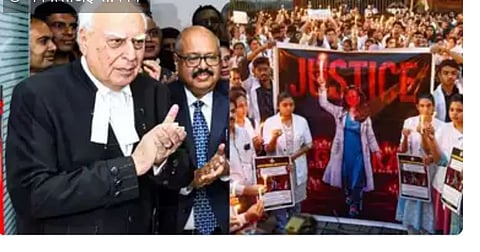Balancing Justice: Legal Rights of the Accused vs. Public Sentiment in High-Profile Cases
New Delhi- In recent weeks, a controversy has erupted over senior advocate Kapil Sibal's decision to represent the State of West Bengal in the Kolkata rape and murder case. This incident has reignited the age-old debate about the legal rights of the accused versus public sentiment, particularly in cases involving heinous crimes. As a legal professional, I feel compelled to share my thoughts on this matter and its implications for our justice system.
The criticism faced by Kapil Sibal for representing the State of West Bengal in this sensitive case highlights a concerning trend of public sentiment overshadowing legal principles. It is important to remember that in our legal system, everyone is presumed innocent until proven guilty. The role of the defense, or in this case, the state's representation, is to ensure that this principle is upheld and that the legal process is followed meticulously.
First and foremost, it is crucial to understand that the right to legal representation is a fundamental principle of our justice system. Article 22 of the Indian Constitution guarantees this right to every person, regardless of the nature of the accusation against them. This right is not just a legal formality; it is a cornerstone of a fair and just society.
The criticism directed at Kapil Sibal for defending the accused/state in this case reflects a dangerous misunderstanding of the role of lawyers in our justice system. Lawyers do not defend crime; they defend the rights of the accused and ensure that the legal process is followed correctly. This distinction is vital for maintaining the integrity of our legal system.
While public outrage in cases of heinous crimes is understandable and often justified, we must be cautious about allowing public sentiment to influence legal proceedings. The purpose of our justice system is to ensure fair trials and protect the rights of all parties involved, including the accused.
In high-profile cases like the 2012 Nirbhaya case, we witnessed unprecedented public anger and demands for swift justice. While the emotions were valid, it is the duty of legal professionals to ensure that even in such cases, due process is followed and the rights of the accused are protected.
The controversy surrounding Sibal's involvement in this case raises larger questions about the independence of the legal profession and the right of advocates to represent their clients without fear or favor. If we allow public sentiment to dictate who can or cannot be represented in court, we risk creating a dangerous precedent that could erode the very foundations of our justice system.
The Importance of Due Process
The principle of "innocent until proven guilty" is fundamental to our justice system. It ensures that no innocent person is wrongly convicted and that the guilty are punished only after a fair trial. When we allow public sentiment to override this principle, we risk compromising the very foundation of justice.
In the Nirbhaya case, despite immense public pressure, the legal process was followed meticulously. The accused were provided with legal representation, and the case went through various stages of trial and appeal before the final verdict was delivered. This adherence to due process, even in the face of public outrage, strengthened the credibility of the final judgment.
As legal professionals, our primary duty is to the court and the principles of justice. When an advocate takes up a case, they are not endorsing the actions of the accused or the stance of their client. Instead, they are fulfilling a crucial role in the legal process—ensuring that all parties receive a fair hearing and that justice is served based on facts and law, not on emotions or public sentiment.
The media plays a crucial role in shaping public opinion, especially in high-profile cases. However, it is essential for media outlets to report responsibly and avoid sensationalism that could potentially influence the legal process. Trial by media can severely compromise the fairness of legal proceedings and the rights of the accused.
As legal professionals and citizens, we must strive to educate the public about the importance of due process and the role of lawyers in ensuring justice. It is possible to condemn a crime while still respecting the legal rights of the accused.
Concludingly, the controversy surrounding Kapil Sibal's involvement in the Kolkata case should serve as a wake-up call for all of us. It highlights the need for a more nuanced understanding of our legal system among the general public.
As we move forward, it is crucial that we strike a balance between public sentiment and the sanctity of our legal process. Justice is not served by denying the accused their legal rights; rather, it is upheld by ensuring a fair trial for all, regardless of the nature of the crime or the strength of public opinion.
Our commitment to the rule of law and the principles of natural justice must remain unwavering, even in the face of the most heinous crimes. Only then can we claim to have a truly just and equitable society.
- Adv. Satyam Singh is a practicing lawyer at the Supreme Court of India, specializing in Constitutional and Criminal Law.
Disclaimer: The opinions expressed in this article are those of the author and are intended for informational purposes only. Readers are encouraged to seek independent legal counsel for any specific legal issues.
You can also join our WhatsApp group to get premium and selected news of The Mooknayak on WhatsApp. Click here to join the WhatsApp group.

